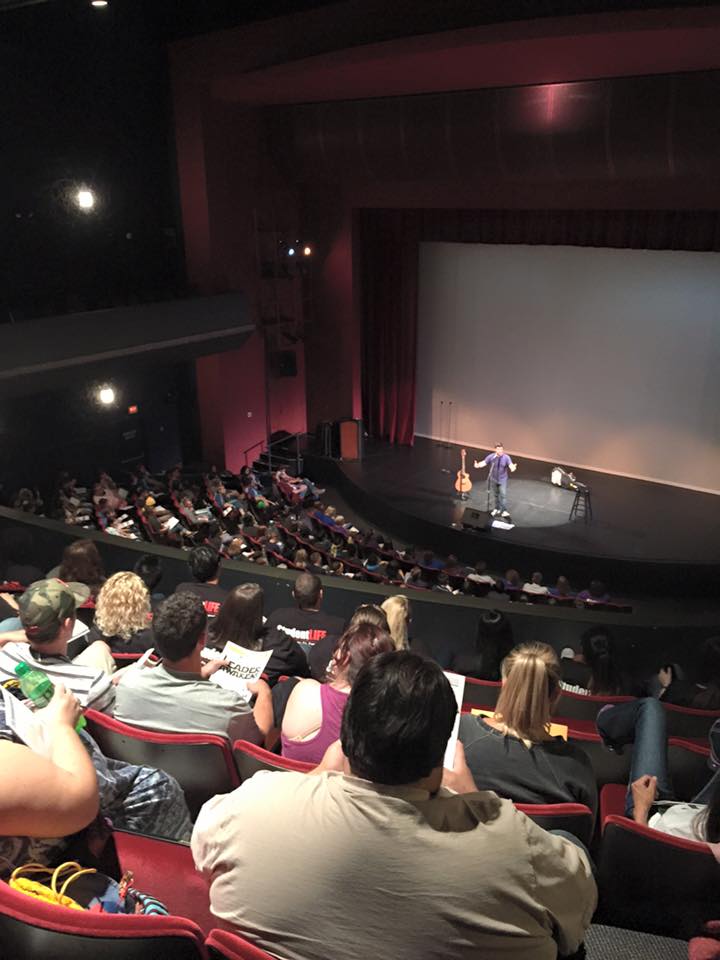 Originally published in the October 2014 issue of “Programming Magazine”.
Originally published in the October 2014 issue of “Programming Magazine”.
As I write this, it’s the beginning of a new tour season and schools are opening up across the country. My days have been filled with flights, rental cars, hotels and a whole bunch of different “stages” on different campuses. It’s from these stages that a touring performer like me hopes to entertain, teach, amaze and inspire. There are so many different stages and possibilities. And we all have one or more of our own. What does your stage look like?
In August in Nebraska, I stood in the middle of a gym floor facing the bleachers on “move in day.” All of the first-year students and their parents filled the stands. The president of the college spoke first and closed with a big, “Go Bobcats!” I was next to the microphone. The smiling and expectant audience members looked down from their elevated positions on their wooden bleacher seats. They listened, sang along and participated in the orientation activities. The “stage” that day was the gym floor.
Later, in Indiana, I spoke in the academic building, where I presented from behind the lectern in the institution’s largest lecture hall. I played with the mouse from a computer that wasn’t being used and joked with the students that everything “would be on the final test.” It was a lecture hall, after all, and I was on the professor’s stage. (You had to be there. I was on fire.)
In Michigan the same week, I was in an old theater, looking out to a sea of yellow orientation shirts emblazoned with burgundy block letters. To differentiate the orientation guides from the new students, the student leaders wore orange shirts and sat up in the balcony. Way up there, they danced to my songs and cheered for their new student teams. The balcony became their stage. We all watched as they danced their funky, choreographed dances. The room was filled with electric energy.
This theater was built for performances. We had a great stage, a great balcony, and a great sound system. But that doesn’t happen every time. Sometimes the stage presents challenges. The very next day and two states to the south, I found myself with a small, portable sound system that sounded “muddy” and unclear in a 150-year-old chapel. It was not easy to understand what I was saying.
It’s in situations such as these that we entertainers need to adapt for our audiences. If an audience can’t understand me, why am I standing in front of them? I followed a hunch as I walked away from the microphone and unplugged my guitar. This particular chapel was built in 1864. It was constructed before electronic amplification existed. It was designed so that a voice could be heard from the pulpit. Why were we trying to improve on the original design? “So, preach!” I said to myself. The chapel was perfect for what turned into an intimate 300-person “unplugged” event. Everyone was able to hear me clearly.
Sometimes the stage surprises you with possibilities.
Whatever your stage, remember that you must always consider the audience experience first. After all, that’s why the event is happening – for the audience. Whether it’s in a cafeteria, an outdoor show, a theater show, or an intimate coffeehouse event, the “stage” is there for the audience. The only reason a performer is elevated or amplified is so that the audience can see and hear them more clearly. From ancient Greece and Rome to London and Tokyo, stages have always been created to better serve the audience experience. The positioning of the entertainer in relation to the audience is always with the audience in mind, to make it easier for them to see and hear the performance.
What is your position in relation to your audience? Where is your stage? Do you have a crowd watching you? Are you leading a team? Perhaps your stage is your chair at your desk in your office, or it’s on the carpet of a hallway speaking to a group of new student leaders, or in front of a classroom, in a boardroom, or at a banquet dinner table. Whatever your position on your stage, you are there to serve your audience. Can you be seen? Can you be heard? What are you saying? Remember that if you are a leader, your position was created to enhance the experience of those you serve. You are the performer.
College president, assistant dean, activities coordinator, treasurer, or chairperson, your title or leadership position is your spotlight. But remember you are in that light only because you are able to help others. What you do in your position matters. What you say matters. How you act matters. There is no doubt that you are a great performer on your stage and, in that spotlight, you have the ability to inspire and do great things. Wherever your stage, whether it be in Tulsa, Toronto or Timbuktu, you take the stage because you can make others’ lives better.
Break a leg.